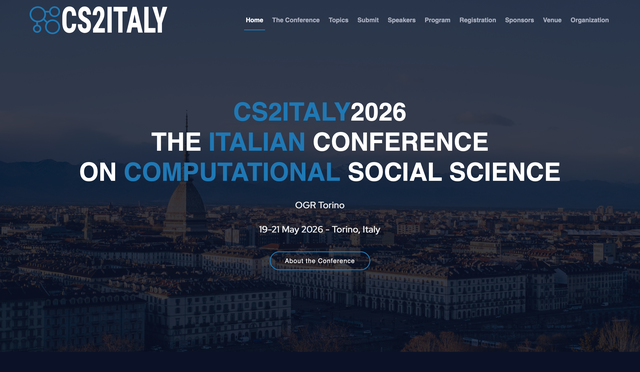
The Italian Conference on Computational Social Science – CS2Italy
May 19-21, 2026 in Torino, Italy.
The CS2Italy Conference is the premier venue for computational social scientists in Italy that serves as a platform for researchers from different disciplines, including economics, sociology, political science, psychology, cognitive science, as well as computer science, network science, and complex systems and others, to explore the intersection of social phenomena and computational methods. We welcome abstract submissions on any topic in the field of computational social science.
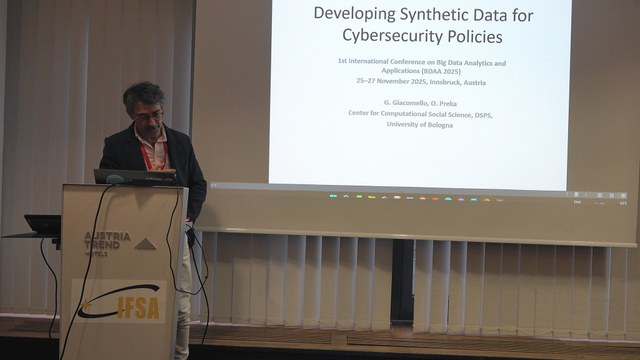
Giampiero Giacomello & Oltion Preka attended the Conference and presented the paper “Synthetic Data Generation for Addressing Cybersecurity Data Scarcity: A Large Language Model Approach” on November 26.
Go to page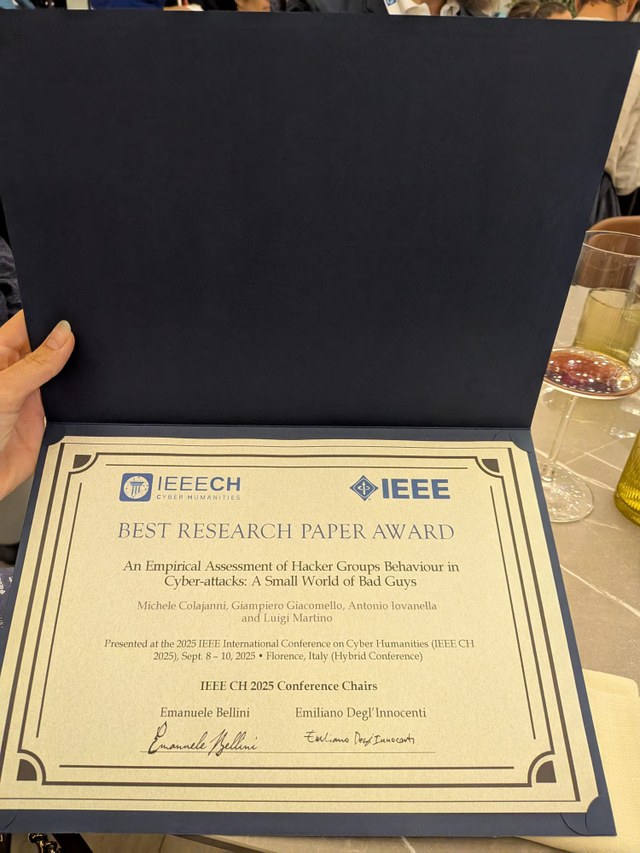
A paper entitled "An Empirical Assessment of Hacker Groups' Behavior in Cyber-Attacks: A Small World of Bad Guys" and
presented by the CSSC's Team at the IEEE -Cyber Humanities Conference (Florence, Italy Sept.8-10) won the "Best Research Paper Award". Congratulations folks! 💫
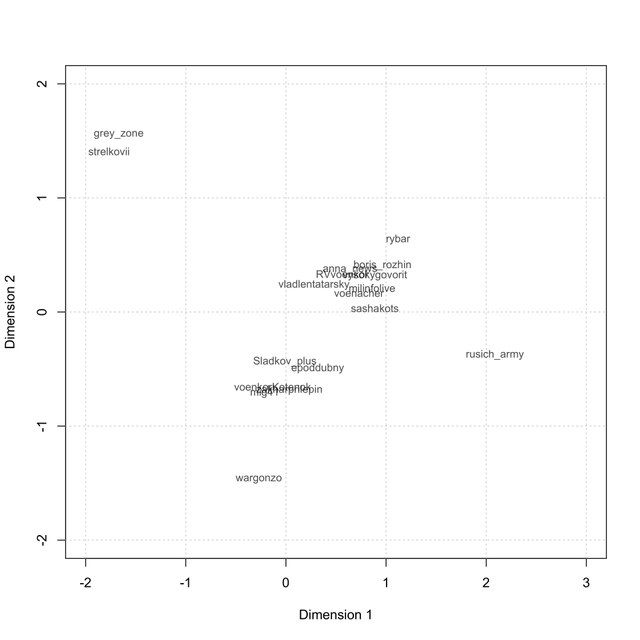
To what extent are the pro-Russian military bloggers on Telegram united in assessing the actions of the Russian generals?
Military bloggers have become an important part of the media landscape, covering the war for the Russian audience, and their popularity also affects discussion in mainstream media about the management of the war, thus indirectly affecting the decisions on the battlefield. Therefore, understanding the “digital arena” of milbloggers is essential to comprehending the dynamics of reciprocal influence between media discussion and political behavior. In this short post, we decided to look at how unified the coverage of the activities of the military command by the authors of these telegram channels is. However, this is only a preliminary analysis.
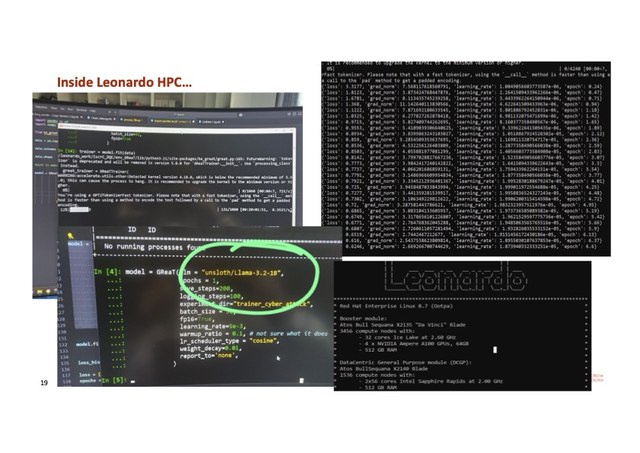
The Department's Team EcoCyber WP4 (Giampiero Giacomello and Oltion Preka) has bee awarded six more months (end of 2025) of VM (Virtual Machine) use for the project "Data Quality in Cybersecurity", part of EcoCyber/SERICS07 (NextGenerationEU) by CINECA. The extension confirms the quality and success of the work done by the Team so far, using a tiny space inside one of the most powerful supercomputers of the EuroHPC infrastructure in Europe (if you're curios about what a VM looks like inside a supercomputer, just take a look at the image here 😉)
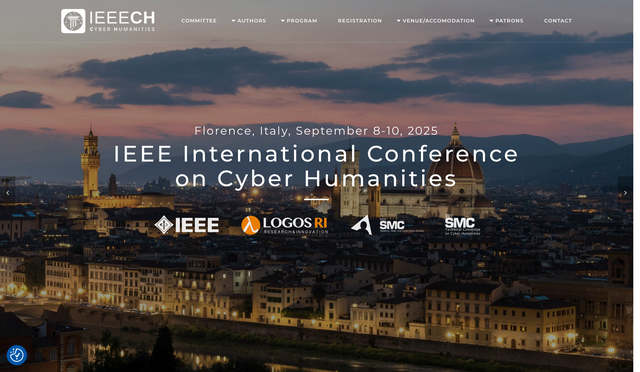
The IEEE International Conference on Cyber Humanities (IEEE CH) is an annual event co-sponsored by the IEEE Systems, Man, and Cybernetics (SMC) Society. The IEEE CSR 2025 conference will be held in Florence, Italy, during September 8–10, 2025, come join us! The IEEE (Institue of Electrical and Electronic Engineering) is one of the most important global professional association in the fields of engineering and computer science.
Go to page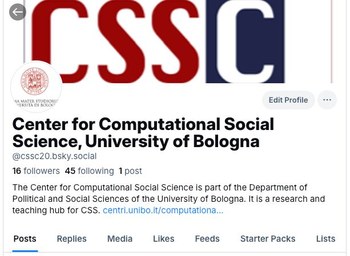
The CssC is now on the Bluesky social network as @cssc20.bsky.social

In this recent paper, the experts interviewed indicates the social sciences as one of the relevant elements of AI policies of the future: C. Weir, A. Dyson, O. Jogunola, L. Dennis and K. Paxton-Fear, "Interlinked Computing in 2040: Safety, Truth, Ownership, and Accountability," in Computer, vol. 57, no. 1, pp. 59-68, Jan. 2024, doi: 10.1109/MC.2023.3318377.
keywords: {Market research; Safety; Complexity theory; Artificial intelligence; Interconnected systems}.

Good news! The Computational Social Science Centre is now on Mastodon.
Follow us to keep up to date with the latest news in computational social science, social and political science and more.
@CssC@sciences.social

The CssC engages with the most relevant contemporary topics. The armed conflict between Russia and Ukraine has been one of our main focal points. Visit our page to get an overview of our research and data analysis on the Russia-Ukraine war.
Go to page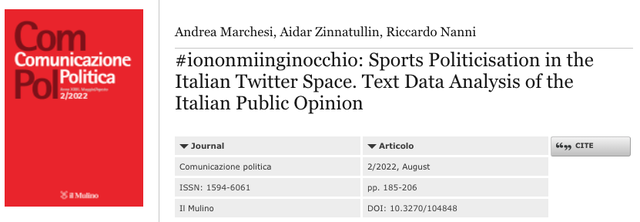
Owing to their popularity, sports often turn into arenas for political contestation. The practice of taking the knee as a symbolic stance against racism was started in 2016 and is entrenched with the Black Lives Matter (BLM) movement. This practice generated discussions in the Italian public opinion during Euro 2020, where the ambiguous stance of the Italian soccer team contributed to the debate. This article addresses this particular case as an example of more widespread practices of antiracist contestation (and public opinion reactions thereto) in sports, approaching Italian public opinion studies from the underexplored angle of computational social science. We collected tweets featuring the hashtag #iononmiinginocchio (and its variations) throughout the duration of Euro 2020. The language used was analysed through network analysis and toxicity analysis to observe the characteristics of the debate and the rhetoric employed. This research finds that, despite politicians’ media visibility throughout the debate, the Twitter discussion was mainly driven by common citizens. In this context, a toxic language encompassing white supremacist, homophobic, and sexist remarks was often employed with a silencing effect on a wide share of the Twitter usership.
Go to page